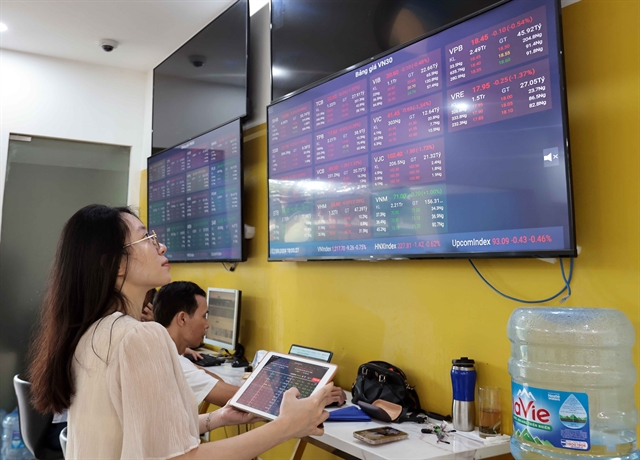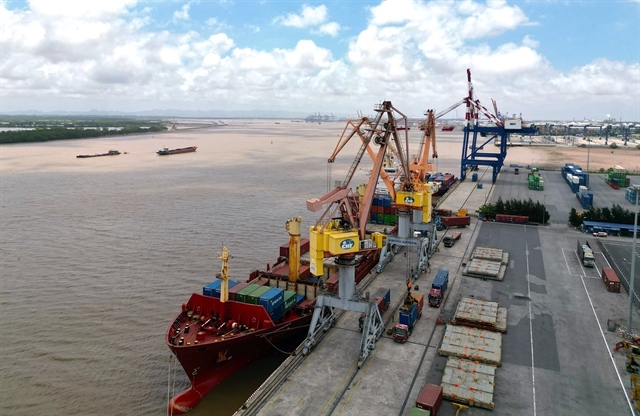Individual domestic investors contributed significantly, adding 157,001 new accounts, the highest figure in six months.

HÀ NỘI — Domestic investors in Việt Nam opened 387,610 new securities accounts in the first quarter of 2025, despite a slight decline of 3.5 per cent compared to the same period last year, according to Vietnam Securities Depository and Clearing Corporation (VDSC).
VDSC said that the net number of new accounts, calculated as the difference between accounts opened and closed, rose sharply in March, totalling 157,380 accounts. This surge marked the most robust performance in six months.
Individual domestic investors contributed significantly, adding 157,001 new accounts, also the highest figure in the same timeframe.
While individual domestic investors showcased remarkable activity, institutional investors joined with a net opening of 188 new accounts in March, surpassing the 61 accounts opened in February.
As a result, the total number of new accounts opened by domestic investors reached 157,189 in March alone, bringing the cumulative total of registered accounts in the country to nearly 9.64 million.
Meanwhile, foreign investors opened only 191 new securities accounts in March, reflecting a modest increase of 63 accounts compared to the previous month. This included 188 accounts opened by individual foreign investors, while the rest belongs to institutional foreign investors.
The total number of accounts opened by foreign investors in the first quarter was 479, bringing the cumulative number to 48,259.
The Vietnamese stock market now boasts nearly 9.69 million trading accounts.
The resurgence in new accounts came amid a generally positive sentiment surrounding the market, which maintained its upward trajectory throughout March.
By the end of the last trading session in March, the VN-Index on the Hồ Chí Minh Stock Exchange (HoSE) closed at 1,306.86 points, showing slight increases of 0.11 per cent from February, while the VN30-Index, tracking the 30 biggest stocks in term of market capitalisation, also rose by 0.55 per cent. However, the VNAllshare index experienced a decline of 1.05 per cent.
Market liquidity demonstrated notable growth in March, with an average trading volume exceeding 878 million shares per day and average transaction values surpassing VNĐ20.8 trillion (US$798.8 million), up 33.2 per cent in trading volume and 31.83 per cent in value compared to February.
Foreign investors had a total trading value exceeding VNĐ97.1 trillion last month, accounting for more than 12.78 per cent of the overall market transaction volume. Nonetheless, they recorded net selling activities totalling over VNĐ9.56 trillion during this period.

The return of foreign capital
A recent report from SGI Capital showed a potential resurgence of foreign capital inflows into the Vietnamese stock market during the latter half of the year.
This optimistic outlook comes in the wake of several economic challenges, particularly those stemming from unexpected tariff policies announced by US President Donald Trump, which have significantly impacted investor sentiment.
The immediate effects of heightened tariffs have manifested in a swift decline in stock prices as both domestic and foreign investors reacted by offloading shares.
The prevailing sentiment among investors is one of caution, given the uncertainty surrounding Việt Nam's economic stability, particularly concerning its export-oriented businesses and the indirect consequences on employment and consumer spending as foreign direct investment (FDI) firms narrow their operational scales.
SGI Capital's analysis suggests that over the next two months, the initial shock from these tariff changes is expected to dissipate as the market adjusts.
"We believe that the risks associated with tariffs impacting investors are rapidly priced in stocks and will gradually subside over the next two months," SGI Capital said in the report.
"In the latter half of this year, foreign capital is likely to return for net purchasing, driven by appealing valuations and the anticipated upgrade to emerging market status."
If negotiations regarding tariffs succeed, resulting in reductions to levels between 10 per cent and 20 per cent, the momentum for export growth and FDI inflows may stabilise, alleviating some concerns regarding economic contraction.
In the case of higher tariffs exceeding 20 per cent, the Vietnamese Government is likely to implement stronger domestic stimulus measures. This could include interest rate cuts, tax relief initiatives and public spending packages designed to support local businesses, absorb labour forces affected by export declines and achieve robust economic growth targets.
SGI Capital emphasises the need to view this market turmoil as a potential investment opportunity. Recent declines have brought stock valuations to historically low levels, sparking interest in long-term investment prospects. — BIZHUB/VNS





